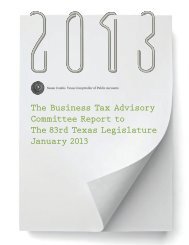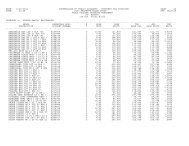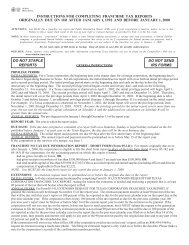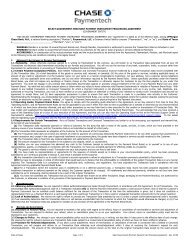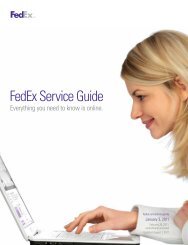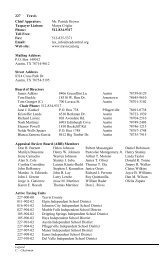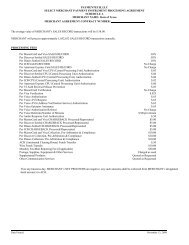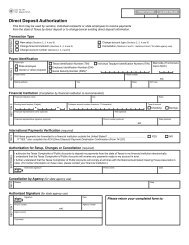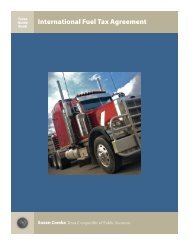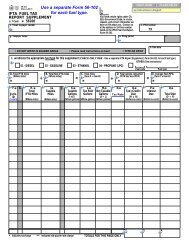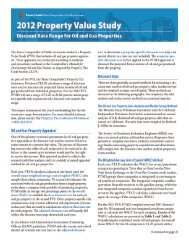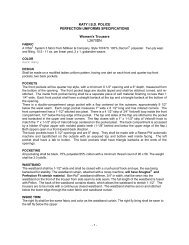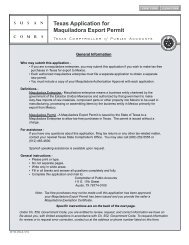Motor Vehicle Tax Guidebook 2011 - Texas Comptroller of Public ...
Motor Vehicle Tax Guidebook 2011 - Texas Comptroller of Public ...
Motor Vehicle Tax Guidebook 2011 - Texas Comptroller of Public ...
You also want an ePaper? Increase the reach of your titles
YUMPU automatically turns print PDFs into web optimized ePapers that Google loves.
• If a partner assumes a lien on a motor vehicle<br />
or gives the dissolving/terminating partnership<br />
any consideration, motor vehicle tax is due. SPV<br />
procedures may apply.<br />
Changes in Partners<br />
When a partner joins or leaves a partnership and<br />
the partnership entity remains intact, the following<br />
guidelines apply:<br />
• If a new partner joins an existing partnership and<br />
contributes a motor vehicle, tax is due whether<br />
or not consideration is paid. SPV procedures<br />
may apply.<br />
• If a partner leaves a partnership and the<br />
partnership transfers a motor vehicle into the<br />
partner’s personal name, tax is due whether<br />
or not the partner paid consideration. SPV<br />
procedures may apply.<br />
If the change <strong>of</strong> partner(s) causes the partnership<br />
entity to dissolve/terminate, the two above guidelines<br />
do not apply. For example, a general partnership<br />
without a partnership agreement that provides for the<br />
continuation <strong>of</strong> the partnership entity upon a change<br />
<strong>of</strong> partner(s) automatically dissolves. Refer to Transfers<br />
Upon Dissolution/Termination <strong>of</strong> a Partnership in this<br />
topic. If a new partnership entity is then formed/<br />
organized, refer to Transfers to Newly Formed/Organized<br />
Partnership in this topic.<br />
Incorporation <strong>of</strong> a Partnership<br />
When a partnership incorporates and transfers a motor<br />
vehicle from the partnership name to the corporate<br />
name in connection with that incorporation, the<br />
following guidelines apply:<br />
• If a newly formed corporation pays no<br />
consideration (other than stock) to the<br />
partnership, no tax is due. The owners <strong>of</strong> the<br />
business simply have adopted a different form <strong>of</strong><br />
doing business. The transfer <strong>of</strong> a motor vehicle to<br />
the newly formed corporation is not a change in<br />
ownership and is not a sale.<br />
• If the corporation pays consideration to the<br />
partnership, motor vehicle tax is due since the<br />
corporation purchased the vehicle from the<br />
partnership. SPV procedures may apply.<br />
Lien Assumption<br />
Any motor vehicle transfer involving the assumption <strong>of</strong><br />
a lien is subject to motor vehicle tax. SPV procedures<br />
may apply.<br />
Partnership as a New Resident<br />
When a partnership enters <strong>Texas</strong> for the first time to<br />
establish residency and to begin doing business, the<br />
partnership is considered a new resident.<br />
To be a new resident, the partnership cannot presently<br />
be doing business in <strong>Texas</strong> or be domiciled in <strong>Texas</strong>.<br />
When a partnership brings a motor vehicle into <strong>Texas</strong>,<br />
the following guidelines apply:<br />
• If the partnership owned the motor vehicle and<br />
brought it into <strong>Texas</strong> at the time the partnership<br />
became a new resident, and the partnership<br />
previously registered the motor vehicle in the<br />
partnership name in another state or country,<br />
the new resident tax applies.<br />
• If the partnership had not previously registered<br />
the motor vehicle in the partnership name in<br />
another state or country, the motor vehicle use<br />
tax is due. SPV procedures apply if the sale <strong>of</strong><br />
the motor vehicle is a private-party purchase.<br />
Credit may be applied for legally imposed sales<br />
or use tax paid to another state. Credit may not<br />
be applied for sales or use tax paid to another<br />
country.<br />
• If the partnership acquired the motor vehicle<br />
out <strong>of</strong> state and brought it into <strong>Texas</strong> for public<br />
highway use after the partnership became a<br />
resident, motor vehicle use tax is due. SPV<br />
procedures apply if the sale <strong>of</strong> the motor vehicle<br />
is a private-party purchase.<br />
A partnership presently doing business in <strong>Texas</strong> cannot<br />
be considered a new resident <strong>of</strong> <strong>Texas</strong>.<br />
III-6<br />
<strong>Motor</strong> <strong>Vehicle</strong> <strong>Tax</strong> <strong>Guidebook</strong>



